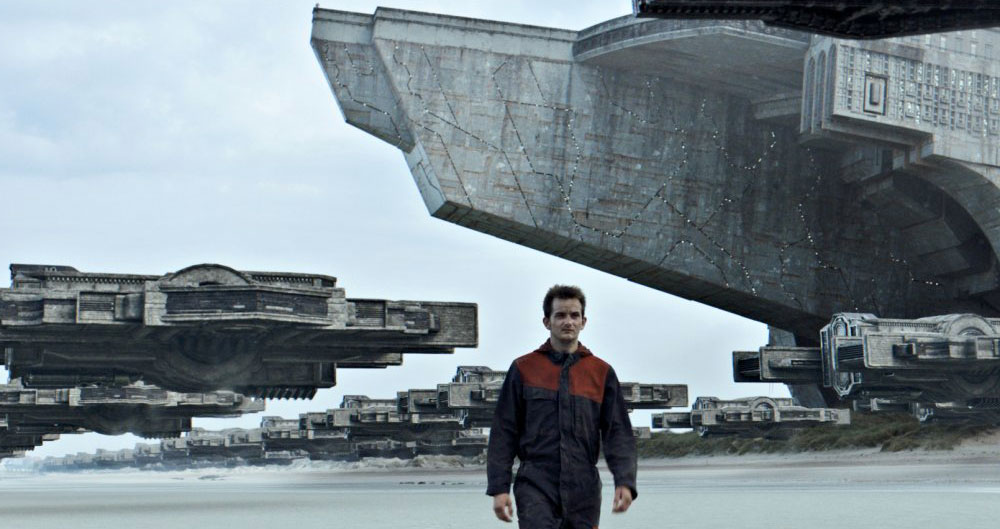
For the past decade, the films of Bruno Dumont have come to us seemingly beamed from another planet: sui generis blends of broad comedy and austere tragedy that never settle into a single tone or interpretation. Starting from Petit QuinQuin (2014), a slapstick murder mystery that plays like a cross between La Bête Humaine (1938) and Mouchette (1967), Dumont has completely rewritten the rules of his own practice in one film after another. He has done so less to push the medium forward, than for pure narrative and genre experimentation, probing at the limits of what contemporary cinema is and can be, while leaping further out into the void with each step. There is the heavy metal Joan of Arc biopic Jeanette (2017), replete with head banging nuns; the sci-fi QuinQuin sequel CoinCoin and the Extra-Humans (2018), that tips the tone of the series closer toward Jacques Tati; the Lea Seydoux-starring France (2021), which repeats the familiar liberal guilt tropes of arthouse cinema ad absurdum, building cycles of suffering and compassion into national allegory and spiritual epiphany. It’s only fitting that his sci-fi infused latest, The Empire, is as otherworldly and inexplicable as films come.
In broad strokes, The Empire is a space opera, a study in neorealist miserablism, a slapstick farce, a love triangle, a landscape movie, a Petit QuinQuin sequel, and a national allegory. In it, the 0s, an evil race of pulsating black orbs that float through space in a ship that looks like Versailles, and the 1s, a wholly good race of bright blue lights residing in a spaceship modeled after Sainte-Chappelle, are pitched in a cosmic battle over the fate of humanity. The 1s want to free us from our barbaric impulses; the 0s want to let hedonism and sin run rampant. Their conflict comes to a head in a dreary coastal town in northern France where a cute Aryan toddler, the Wain, is set to grow into the embodiment of evil. Jane (Anamaria Vartolomei), a light-saber wielding, bikini-clad 1 warrior, wants to kill him. His father Jony (first time actor Brandon Vlieghe), a working-class 0 fisherman often seen riding a white horse, fights to stop them. Meanwhile, tumbling around the outskirts of the plot, are the two bumbling gendarmerie from the QuinQuin films (Bernard Pruvost and Philippe Jore), oblivious to the cosmic scope of things and trying to solve the easily-solvable murder of the Wain’s mother.
Very little action, plot movement, or resolution occurs in The Empire. We are firmly in the territory of Dumont’s languorous tableau style, which is dominated by long takes and wides filled with blunt gestures and emotions. Performances, especially of the towns-folk who are mainly played by non-actors, feel Bressonian in their penchant for stillness over expression and resolute opaqueness. The tonal register is almost monotonous in its matter-of-fact simplicity—even lightsaber battles and pratfalls are played deadpan. Tactile excitement is eschewed for an off-putting perpetual absurdity. Both space and soap opera are played completely straight, but it's precisely the lack of clear irony or satire that makes the film equally disappointing and invigorating. The film is disappointing in the ways it persistently eludes any legible narrative, generic, tonal, or intellectual focus, and invigorating in the unmooring this produces.
What makes Dumont’s cinema so compelling is his ability to continually hold so many contrasting tonalities at odds with one another while probing easily familiar contemporary genres and reference points. Even the semblance of the film being a QuinQuin sequel rests uneasily between being a trivial source of humor, an inquiry into the idea of cinematic universes, and a handy metaphor for the place of the curious and confused spectator. In the grandiose fracas of the film’s Star Wars-esque finale, the two gendarmerie remain resolutely earth-bound, guffawing at the chaos and being mocked by a small child, all while understanding nothing. It’s precisely in its pitch between irony and sincerity, between escapist farce and austere miserabilism, that the film is most prescient and resonating: it’s a mood piece for our age of hysterical uncertainty and perpetual confusion.
The Empire screens this afternoon, and throughout the week, at IFC.


